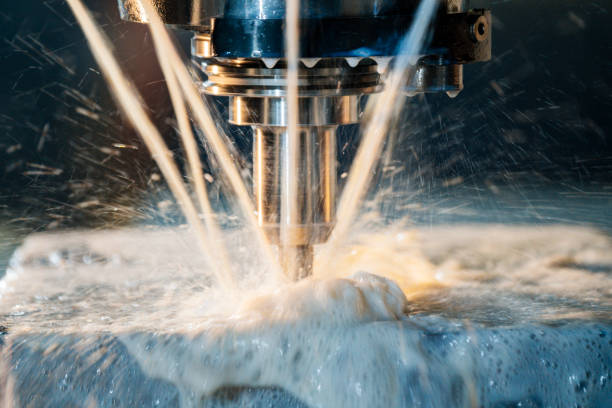Evaluations pertaining to the modern manufacturing environment reveal that accuracy is an imperative requirement in order to manufacture parts that match the standard representations in the best possible manner. CNC turning has thus turned out to be one of the best methods of attaining such a high level of accuracy. CNC turning can help with both small testing of the product in terms of running test productions to large-scale production of items across a range of sectors including aerospace, automotive, and medical technology. From this paper, it is evident that for a precision machining company, the integration of CNC turning provides the best solution. This article will discuss various benefits associated with the CNC turning as well as the factors that make it an ideal solution for precision turning applications.
Exceptional Accuracy and Consistency
CNC turning is also preferred for producing precise and uniformity turning parts and job works, which is one of the biggest benefits of the technological process. It is a complex and automated machining technique involving the use of computers to control turning machinery, in contrast to conventional techniques for turning and machining. This must be done in order to ensure that all parts are manufactured to specific needs even in the case of mass production. Regardless the required accuracy and detail levels are high, CNC turning offers less variations from part to part. To a precision machining company with such customers the consistency is crucial for meeting such precise demands of customers of such sectors as aerospace or medical technology that is where a slightest deviation can often mean a lot.
In addition, CNC turning machines are fitted with specific software that enables even the most elaborate operations to be carried out automatically. Machines used in manufacturing are very accurate in that they enable manufacturers to produce complex parts which are very detailed without having to carry out further intricate finishing. Such a level of accuracy makes most sense in industries like electronics and medical devices where most of the components required are very accurate. Since each part is machined to be exactly the same, CNC turning eliminates flaws in the product to provide greater product robustness.
Efficiency and Cost-Effectiveness
This is another form of benefit that goes with CNC turning with price tagged alongside. Due to the use of many machines and mechatronics, this process does not require manual effort and shortens the process. CNC turning machines can work in solitude, hence delivering very many parts in one go with a lot of time between halts. This results in short turnover times which is quite essential for companies which deal with products that have certain time limits. In addition, CNC turning eliminates much waste in material cutting and achieves rigid repeatability in cutting paths and tool orientation. Reducing mistakes and redoing, the manufacturers manage to save valuable time and money. To a precision machining firm, this efficiency means that a company can offer competitive prices of its services without jeopardizing quality.
Unlike CNC turning lathes, CNC turning machines also help the manufacturers to achieve the best solutions in terms of the organization of the production process since several operations can be done in one mode. For instance, turning, threading, and drilling processes can be accomplished by the same tec; without having to shift from one machine to another. This makes work much faster and easier to execute, as it eliminates the time taken to set up a new project. Furthermore, CNC turning does not have room for handwork or approximation thus eradiculating the high chances of delay and material loss due to approximation differences. The implication is that not only do businesses concerned get to save on the costs of production through CNC turning but also get to enjoy enhanced efficiency in the profitability of operations, thus making it a more valuable tool for operations in businesses of all sizes.
Scalability and Versatility
CNC turning is highly versatile, the process can be used on metals such as aluminum, steel and titanium, plastics and even composite materials. Due to flexibility in operation, CNC turning can be used in many sectors and regions with ease. From the aerospace industry requiring light parts to automotive, where robust parts are required, CNC turning is capable of handling all of these. Another advantage which offers almost exclusive opportunity for its use for custom parts is its capacity for creating complicated forms and shapes.
Moreover, the CNC turning technique is easy to scale, which means that even if a company is producing fifty pieces of a particular turn part or five thousand pieces of the same turn part, using the CNC turning technique will be efficient. Low volume jobs require accurate and highly specific positioning offered by CNC turning operations, while high volume jobs can be run through automation at comparatively high rates of efficiency. The scalability benefits a CNC turning company in such a way that they can work for a variety of clients –from small companies to gigantic corporations- with the same degree to perfection. Moreover, scalability affords organizations the capacity to produce varying quantities without having to make significant qualitative changes hence compete effectively in volatile markets.
Enhanced Quality Control and Automation
Computer numerical control turning machines have monitors which give signals when a part is manufactured or machined to specific dimensions. Substantial errors are not possible to occur, as sensors and feedback systems automatically identify violations and provide corrections in real time, which ensures controllability of quality during the production stage. The level of quality assurance for this kind of product is highly desirable especially for products that will be used in aerospace industry and medical devices where precision is required. Through increasing consistency, CNC turning eliminates or reduces rework or product recall situations, hence enhancing business credibility and customer satisfaction.
Additional advantages of CNC turning are provided by automation of the process. Consequently, depending on machines to do most of the work, the process becomes safer, even at work places; as there are few workplace mishaps. Furthermore, organizational procedures are well controlled and do not falter since automation affords organizations the chance to adhere to time sensitive deadlines. For a CNC turning company, the ability to fold in the automation feature as well as quality control mechanisms delivers a unique advantage, which ensures that the firm delivers high-precision machining results. The use of CAD and CAM also complements each other in design for the production process thus facilitating the implementation of complex designs produced.
Conclusion
Through the recent years, CNC turning has become well known in the manufacturing industry because of its capability to provide very high levels of accuracy, flexibility and productivity. In the case of any precision machining company it is only possible to bring in the processes through understanding that it is possible to have the highest standards of quality without necessarily having to spend so much. Starting from high accuracy and scalability to improved quality control, CNC turning is a crucial resource for precision cutting operations. CNC turning offers various benefits which, through collaboration with an experienced CNC turning company, help organizations manufacture accurate components that could be used in prototypes or actual production runs. However, CNC turning remains a critical technology for manufacturing in a high speed, high accuracy environment. As a highly versatile technology, CNC turning is seen as the best practice in achieving optimal manufacturing outcomes at an organisational and industrial level.




